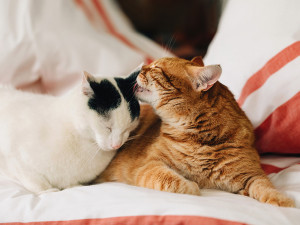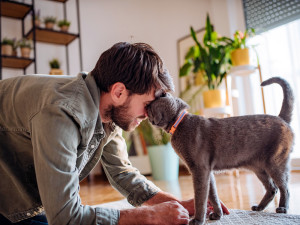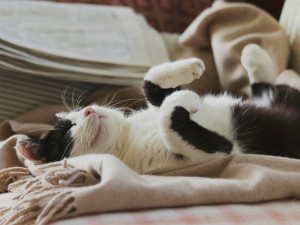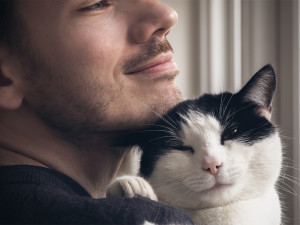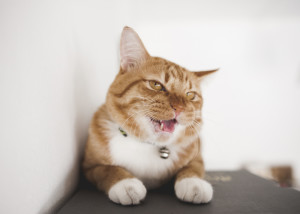Do Cats Grieve When Other Cats Die?
And you can best comfort your sad kitty.

Share Article
During the pandemic, I adopted two 14-year-old cats: Pumpkin and Bear. Born of the same litter, they were adopted as kittens and surrendered together almost a decade and a half later. Although they were old and came with a lot of medical problems, they were wonderfully energetic and playful. They would wrestle on the bed every morning after their zoomies and curl up together to share a too-small patch of sun on the carpet after breakfast. They groomed one another and wherever one went, the other followed. They were deeply bonded.
Then Bear got sick, and within a matter of days, I had to put him to sleep. I returned to the house with his empty carrier and apologized to Pumpkin for not being able to save his brother and very best friend. I expected him to be upset, but it was hard to know what he was feeling.
Although he often played with Bear, he was never particularly interested in toys, so I couldn't tell if he wasn’t playing with me because he was sad or because he just wasn’t into the kind of play I could offer him. He ate the same and drank the same and went to the bathroom the same. He let me hold him and continued to sleep curled up in my arms, though he moved from my left side to my right (formerly Bear’s side).
Was he grieving? I wondered. Is that even something cats do?

The short answer is yes.
New research says that it seems cats may experience griefopens in new tab. The study “Is Companion Animal Loss Cat-Astrophic?” published in the journalopens in new tab Applied Animal Behaviour Science, found that cats do exhibit behaviors often linked to grief. The cats cited in the study had a decrease in their normal behaviors: eating, sleeping, playing.
The study also found that the longer the cat had lived with their departed pal, the more attention-seeking behaviors the kitty displayed. The journal article does note, though, that higher levels of these behaviors were also connected to pet parents who were more attached with their pets. In other words, these people may be projecting some of their own feelings of grief onto their surviving cat (aka anthropomorphism).
But because not all cats exist in the context (went there, had to) of a study, we spoke to a behaviorist about what he’s observed in cats IRL.
“Some do and some do not,” says Stephen Quandtopens in new tab, cat expert and behavior consultant at Cat Behavior Helpopens in new tab. Because cats do not have language and because we cannot read their minds, we can only guess at their feelings based on their behavior. “Cats that grieve the loss of a human or another animal — usually a dog or another cat — can appear depressed, lethargic, may exhibit a loss of appetite, may be needier than usual, or could become more vocal.”
Pumpkin did become slightly more vocal after Bear’s death, but not right away. When Bear was alive, after one of the few times I ever heard Pumpkin meow, Bear immediately bopped him on the nose, as if to tell him to cut it out. So I suspect, if anything, he felt freer after Bear’s death in that regard. But, I’m just guessing. And either way, the change was gradual and delayed, not immediate.
“Many cats won’t start grieving until they have decided that the missing companion isn’t coming back,” Quandt says. “For that reason there is often a ‘searching phase’ where the cat appears to be looking for the missing friend by wandering — walking around and calling out (meowing). Only later does this behavior stop and they move into a grieving stage.”
Did Pumpkin wander around looking for his friend? I don’t think so. And my apartment is small with very few hiding spots, so if he did, he would have checked all the places Bear could be within a matter of minutes.
I felt a tremendous sadness and sense of loss — like a literal gaping hole in my chest — after Bear died. I missed the feel of his fur and skinny little body under my hand, the way his two remaining teeth stuck out of his mouth, and his insistence on sitting in my lap while I worked. And I’d only had Bear for a few months, so I imagined whatever sadness I felty was only a fraction of what Pumpkin felt.
But we don’t really know how cats feel grief.
Exactly what grief means to a cat, though, and how it relates to or differs from our own grieving process is “essentially unknowable,” per Quandt. “All we can really do is observe their behavior and describe what we see, understanding that the more meaning we [ascribe] to these observations, the less accurate those meanings are likely to become.”
For example, your cat might be lethargic, less playful, less hungry, or seem less engaged in life after the loss of their buddy. These are observable behaviors. These are facts. But why they are feeling this way is just human inference and, often, projection. You are sad about the loss of your animal, so you project that feeling onto your cat. You might be right, but, again, because cat’s do not have language and because we cannot read their minds, there is no way of knowing for sure.
“It is important to remember that anyone, including humans, can have feelings without thoughts,” Quandt says. So, a cat can be feeling sadness, loneliness, confusion, etc. without actually thinking to themselves, I feel sad because my friend died. Instead, they might just feel the loss of another furry body next to them as they lay in a familiar patch of sun or when they arrive at their food bowl during feeding time. But they may not really know what that feeling is or why they are having it.
Even if they are aware of the feeling, they don’t have the language to express it. Plus, it’s unlikely that they could name that feeling, let alone figure out where it’s coming from.
What can you do to make your grieving cat feel better?
If your cat is exhibiting changes in behavior following the death of a fellow pet or a human family member, there are things you can do. “While going through this process, give them all the attention, love, and affection you can,” Quandt says. “Create new rituals with them that they can look forward to, like scheduled enrichment [play] with you that you do at the same time every day to give them a new routine.”
Quandt advises against getting a new cat to fill the hole left by the old one, at least not right away. Give them time to adjust, first. “There may be exceptions to this,” Quandt says. “But it’s hard to know if your cat is one of those, so try to let them move through this phase at their own pace, without adding a new companion animal.” After all, introducing a new animal can be very stressful for your cat even at the best of times. And even cats who were previously bonded might not like being around other cats after their friend dies.
Pumpkin lived for two more years after Bear died and though the two of them were the best of friends, he had zero interest in sharing space with other cats. When I fostered another cat a few months after Bear’s passing, thinking Pumpkin would appreciate the company, he hissed and avoided the new cat at all costs. And he behaved the same way a year later, when I tried again.
I realized then that maybe I wanted another cat more than Pumpkin did and since I see cat parenting (especially when it comes to older cats) as an act of service, I decided it was more important to focus on his wants than my own.
Should you let your healthy cat watch your other one die?
However Pumpkin was feeling without Bear, I think I did a good job taking care of him at that time. I was working from home, so I was able to give him lots of attention and without Bear around, he didn’t have to compete for my affection, which I think he appreciated (he was always a jealous boy).
The one thing I sometimes wonder is if it would have been helpful to Pumpkin to have been in the room when Bear was put to sleep. “This can be helpful in theory, as it may prevent the searching phase, but it’s not always practical,” Quandt says.
Logically, I knew Bear was dying, but I didn’t know that trip to the vet would be his last until I spoke to the doctor. If I had it all to do over again, I would hire someone to come to my home and put him to sleep and let Pumpkin hang out in the room with Bear (or not, as was his preference). But I can’t change what has already been done.
If you have a cat who is sick and dying and are considering making your other cat a part of the euthanasia process, make sure to first note how your surviving cat is interacting with their buddy during their illness.
In the end, every family is different. Do what’s best for yours.
Often, Quandt says, the surviving cat will start to distance themselves from the dying cat, so if that is the case, it is best to respect their wishes and not force them together for the other cat’s euthanasia. Alternately, if your surviving cat is keeping watch over their dying friend and sticking close to them, when it comes time to put them to sleep, you might want to consider at-home euthanasia, so they can be together at the end and your surviving cat can perhaps better understand that their friend is now dead, rather than just not here.
Whatever you decide to do, as long as you give your surviving cat time to adjust and plenty of affection, you’ll be doing the right thing. And they’ll certainly appreciate any extra cuddles, play time, or treats they get during that time, whether they are grieving or not.
References:

Charles Manning
Charles Manning is an actor and writer based in New York City. In his free time he likes to cook, go swimming at the public pool, volunteer at the LGBTQ senior center, and foster senior and special-needs cats. His work has previously appeared in Cosmopolitan, Elle, Marie Claire, Harper’s Bazaar, Seventeen, and Nylon.
Related articles
![cat snuggling man]()
What’s Your Cat’s Love Language?
Five surprising ways cats show affection (and how you can show it back), according to a cat behaviorist.
![a cat making a strange face with its mouth open.]()
Is Your Cat Judging You?
That disapproving sneer is actually the “Flehmen response.” A cat behaviorist explains how to read cats’ lips.
Do Cats Like to Be Touched? These Are the Places They Prefer to Be Pet
And the surprising way to get your kitty to be more affectionate.
Can Cats Have ADHD?
A question you may be asking after you observe any number of their behaviors...
Can Cats Smile? 5 Signs of Really Happy Cats
My, what lovely teeth they have...
![Bengal cat with a calculator, bills and coins on the background of the room.]()
Kittens Are Smarter Than Puppies, Study Says—And Really Good at Math
They aren’t exactly CPAs, but they can probably tell you which piggy bank has more coins in it.
